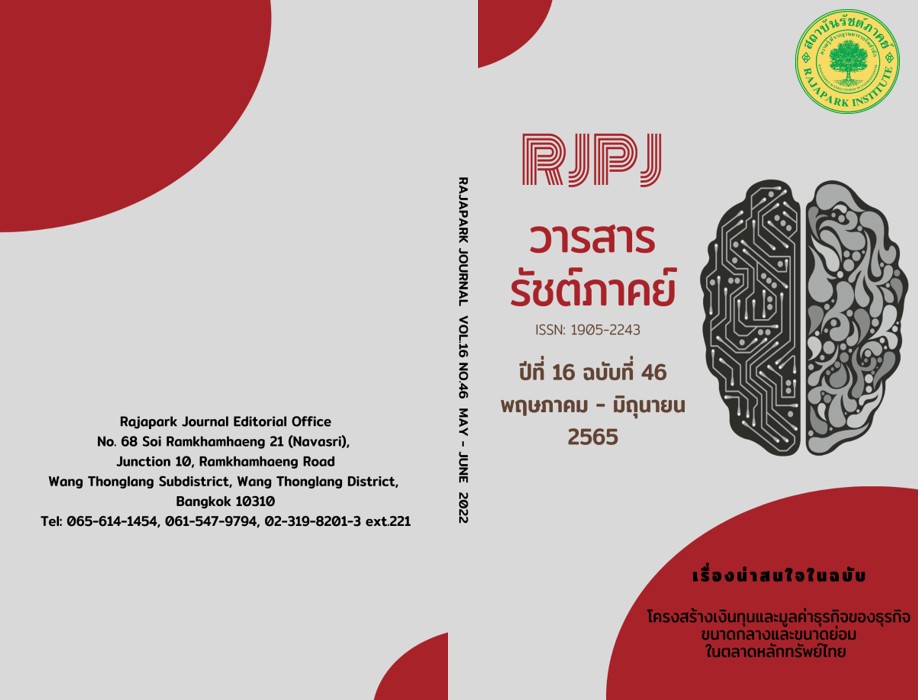Developing a Program to Enhance Innovative Leadership of Primary School Principals in Thai Education 4.0 Era
Main Article Content
Abstract
Objectives research 1) To develop a program 2) To assess the program to enhance the innovative leadership of elementary school administrators in the Thai Education 4.0 era. This was mixed-use research. A sample of 375 schools. The model was examined and the program was improved by group discussion with 15 experts. The data were analyzed with mean and standard deviation. The research findings were as follows: 1) The program draft has 5 parts: (1) principles and objectives (2) content of development activities (3) development process (4) measurement and evaluation and (5) success of program implementation. use There were 5 learning sets, namely (1) Vision for Change, (2) Creativity, (3) Creation of an Innovative Organizational Atmosphere, (4) Teamwork, and (5) Courage. 2) Program evaluation results. Overall, the suitability was at the highest level ( = 4.67), the possibility was at the highest level (
= 4.65), and the usefulness was at the highest level (
= 4.71). 3) The results of each assessment found programs and learning kits. Each issue is possible. and useful at the most level of every issue by the learning set of 4 aspects of working as a team the most appropriate (
= 4.76) Learning Package 1 vision of change is feasible (
= 4.76) and useful (
= 4.79) the most. The level of usefulness (
= 4.67, 4.48, and 4.61 respectively) was lower than the other learning sets.
Article Details

This work is licensed under a Creative Commons Attribution-NonCommercial-NoDerivatives 4.0 International License.
Views and opinions appearing in the Journal it is the responsibility of the author of the article, and does not constitute the view and responsibility of the editorial team.
References
Aphaiso, P. (2014). Program to Develop Transformational Leadership of Educational Institution Administrators Aimed at the Learning Organization of Schools Under the Office of Primary Education Service Areas. Nakhon Phanom Province[Doctoral Dissistation, Sakon Nakhon Rajabhat University.
Chongcharoen, K. (2019). Innovative Leadership. (Innovative Course in Educational Administration and Leadership). Sukhothai Thammathirat Open University.
Cronbach, L. J. (1970). Essentials of Psychological Testing. Harper & Row.
Gunnarsdottir, R. (2013). Innovation Education: Defining the Phenomenon. In L.V. Shavinna (Ed.). The Routledge International Handbook of Innovation Education. Routledge
Kunthin, P., Manokarn, M., & Thongngok, T. (2017). Innovative Leadership of Civil-State School Administrators inChiang Mai PrimaryEducational Service Area 5. Veridian E-Journal, Silpakorn University (Humanities, Social Sciences and Arts), 10(3), 1833-1848. https://he02.tci-thaijo.org/index.php/Veridian-E-Journal/article/view/110232
Office of Policy and Strategy Office of the Permanent Secretary, Ministry of Education. (2018). Strategy of the Ministry of Education (2020-2022). https://www.moe.go.th/moe2019_assets/pdf/แผนยุทธศาสตร์กระทรวงศึกษาธิการ (พ.ศ. 2563 – 2565).pdf
Office of the Education Council, Ministry of Education. (2018). National Education Standards 2018. 21century.
Office of the National Education Commission, Ministry of Education. (2018). The National Education Act of 1999 and its amendments (No. 3). Office of the National Education Commission.
Paengthai, S. (2016). The Role of Educational Institution Administrators in the 21st Century. Journal of the Graduate College of Asia, 6(1), 7-11.
Porter-O’Grady, T., & Malloch, K. (2010). Innovation Leadership: Creating the Landscape of Healthcare. Jones & Bartlett Learning.
Sinlarat, P. (2018). Education 4.0 is more than education (5th ed.). Chulalongkorn University.
Teanprapakun, P. (2018). Leadership of School Administrators in Education 4.0. Veridian E-Journal, Silpakorn University (Humanities, Social Sciences and Arts), 11(2), 1994-2013. https://he02.tci-thaijo.org/index.php/Veridian-E-Journal/article/view/143779
Thipwaree, P. (2015). A Development Model of Innovative Leadership for Institute of Physical Education[Doctoral Dissertation, Prince of Songkla University].
Thorsteinsson, G., & Denton, H. (2003). The Development of Innovation Education in Iceland: a Pathway to Modern Pedagogy and Potential Value in the UK. Journal of Design and Technology Education, 8(3), 172 179.
Thummatasananon, S. (2018). Deveoping Program to Strengthen Learning Leadership of Basic School Administrators. Journal of Educational Research Faculty of Education, Srinakharinwirot University, 13(2), 169-182. http://ejournals.swu.ac.th/index.php/jre/article/view/11052/9167
Weiss, S.D., & Legand, P.C. (2011). Innovative Intelligence. John. Wiley & Sons.


